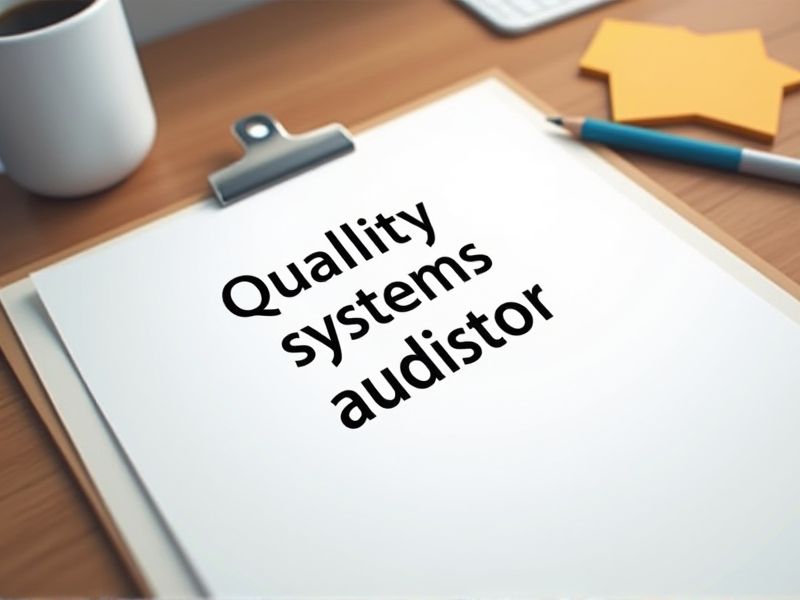
Quality systems auditors require certain certifications to ensure they possess the necessary knowledge and skills to evaluate the effectiveness of an organization's quality management system. Certifications validate an auditor's understanding of industry standards and compliance requirements, which is crucial for maintaining consistent product quality and safety. Companies often seek auditors with specific certifications to mitigate risk and uphold regulatory standards during audits. Key certifications for a Quality systems auditor provide industry-recognized credibility and fundamental expertise essential for fulfilling the role effectively.
ISO 9001:2015 Lead Auditor Certification
ISO 9001:2015 Lead Auditor Certification provides auditors with a deep understanding of the quality management systems, which is crucial for effectively evaluating an organization's adherence to international standards. This certification enhances an auditor's ability to identify areas for improvement, promoting more efficient processes and higher-quality outcomes within an organization. It also signifies the auditor's competence and credibility, which is essential for maintaining the trust of stakeholders and ensuring compliance with regulatory requirements. Organizations often prefer certified auditors because their training helps in minimizing non-conformities and enhancing overall operational efficiency.
ASQ Certified Quality Auditor (CQA)
The ASQ Certified Quality Auditor (CQA) certification validates the auditor's proficiency in quality system auditing concepts and principles, ensuring high standards in quality management. This credential supports auditors in identifying process improvements, which can lead to increased operational efficiency and reduced waste. Organizations benefit from having certified auditors by enhancing compliance with regulatory standards, minimizing the risk of costly non-conformities. Individuals with the CQA certification often see improved career prospects due to the recognized expertise and credibility it provides within the quality management field.
Certified Manager of Quality/Organizational Excellence (CMQ/OE)
The CMQ/OE certification equips quality systems auditors with a comprehensive understanding of quality management principles, enhancing their ability to identify system weaknesses. It validates the auditor's expertise, increasing credibility and trust among stakeholders and organizations. The certification training emphasizes leadership and team dynamics, critical for leading audits effectively and promoting continuous improvement. Familiarity with strategic frameworks and quality tools like Six Sigma ensures auditors can provide actionable insights for organizational excellence.
Six Sigma Green Belt Certification
Possessing a Six Sigma Green Belt Certification equips a Quality Systems Auditor with a comprehensive understanding of process improvement methodologies. This knowledge allows auditors to identify and address inefficiencies and defects in quality processes effectively. The certification enhances an auditor's credibility and skillset in data-driven decision-making, relevant for enhancing organizational performance. Employers often prefer auditors with this certification since it signifies a commitment to maintaining high standards in quality management systems.
Six Sigma Black Belt Certification
Gaining the Six Sigma Black Belt Certification equips a Quality Systems Auditor with in-depth knowledge of process improvement tools, leading to more effective audits. The certification enhances problem-solving skills, enabling auditors to identify and mitigate quality issues efficiently. This qualification builds credibility and trust, as stakeholders recognize the auditor's commitment to excellence. It ensures the auditor can drive continuous improvement, harmonizing organizational processes with quality standards.
Lean Six Sigma Certification
Lean Six Sigma Certification provides auditors with structured methodologies to identify inefficiencies and areas for improvement within quality systems. Certification enhances the auditor's ability to use data-driven decision-making, crucial for precise quality evaluations. Understanding Lean Six Sigma tools allows auditors to effectively communicate improvement strategies across various organizational levels. Credentialing in Lean Six Sigma fosters credibility and trust, elevating the auditor's influence during the implementation of quality initiatives.
ISO 13485 Lead Auditor Certification
ISO 13485 Lead Auditor Certification is essential for quality systems auditors because it ensures they are proficient in auditing medical device quality management systems, which are crucial for regulatory compliance. Certification demonstrates a comprehensive understanding of risk management, crucial for maintaining safety and effectiveness in medical devices. It enhances auditors' ability to identify and resolve potential issues in quality systems, thereby improving the overall quality and reliability of medical products. With certification, auditors gain credibility and recognition, increasing trust and opportunities within the medical device industry.
IATF 16949 Auditor Certification
The IATF 16949 Auditor Certification aligns with global standards required for quality management systems in the automotive industry, ensuring consistent process audits. Certification equips auditors with a comprehensive understanding of automotive industry specifics, crucial to identifying and mitigating potential risks in manufacturing processes. The certification enhances credibility and effectiveness in audits, fostering client trust and compliance with international market requirements. This qualification helps organizations improve operational efficiency, reducing defects and meeting customer demands effectively.
FDA Quality System Regulation (QSR) Auditor Training
The FDA Quality System Regulation (QSR) Auditor Training provides auditors with essential knowledge about compliance requirements, ensuring they understand the regulatory standards set forth by the FDA for medical devices. This training helps auditors accurately assess an organization's quality management system, leading to a stronger adherence to necessary safety and efficacy standards. Being trained in QSR ensures auditors can effectively identify non-conformities, potentially reducing the risk of product recalls or regulatory actions. Enhanced auditor competency through such training increases overall trust in the company's compliance and product quality, which is crucial for market access and consumer safety.
ASQ Certified Quality Improvement Associate (CQIA) Certification
Possessing an ASQ Certified Quality Improvement Associate (CQIA) Certification enhances a quality systems auditor's understanding of quality improvement principles, which increases the effectiveness of their audits. The certification provides auditors with tools to identify, analyze, and solve quality problems, leading to more focused and impactful audit results. By holding the CQIA certification, auditors demonstrate a commitment to professional growth and industry standards, instilling trust among stakeholders. This certification ensures auditors are equipped with a foundational knowledge of quality management, which facilitates the implementation of systemic improvements within an organization.
Summary
As you obtain certifications, your credibility as a quality systems auditor is likely to increase. This enhanced credibility can lead to more career opportunities and potentially higher salary prospects. Employers may also place greater trust in your assessments, knowing you possess a certified level of expertise. Consequently, your ability to influence quality improvements within organizations may significantly strengthen.
